Religion and science in Augustino’s ideology
The relationship between religion and science is considered a controversial
topic for Western European philosophy in Middle Ages. A number of philosophical
theologians including Augustino mentioned this issue. Within this brief research paper, the
author clarifies Augustino’s definition of relationship between religion and science in three
aspects: The purposes of true religion and true science; Dialectic between faith and reason -
the basis of relationship between religion and science; The correlation between philosophy
and theology, religion and science.
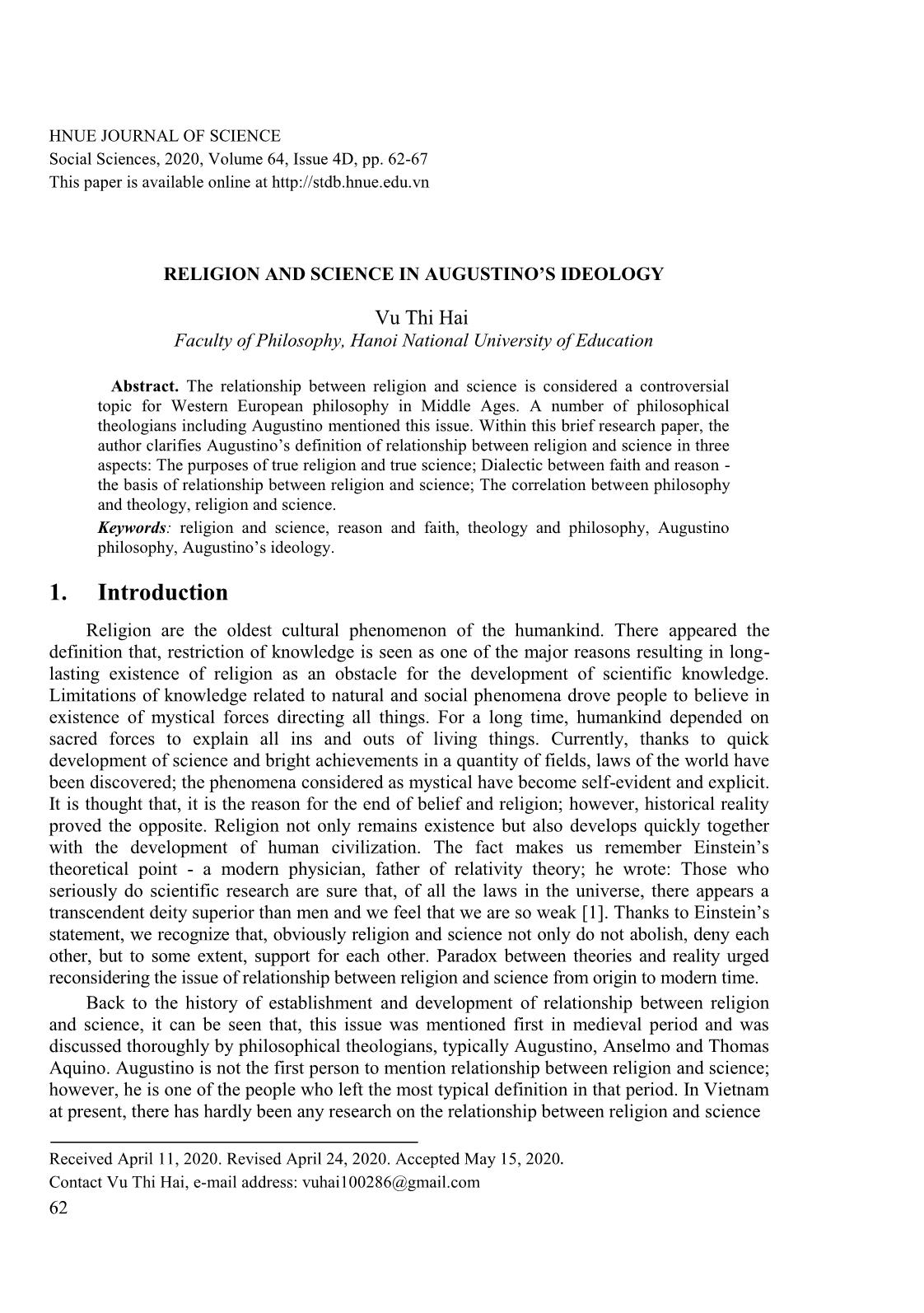
Trang 1
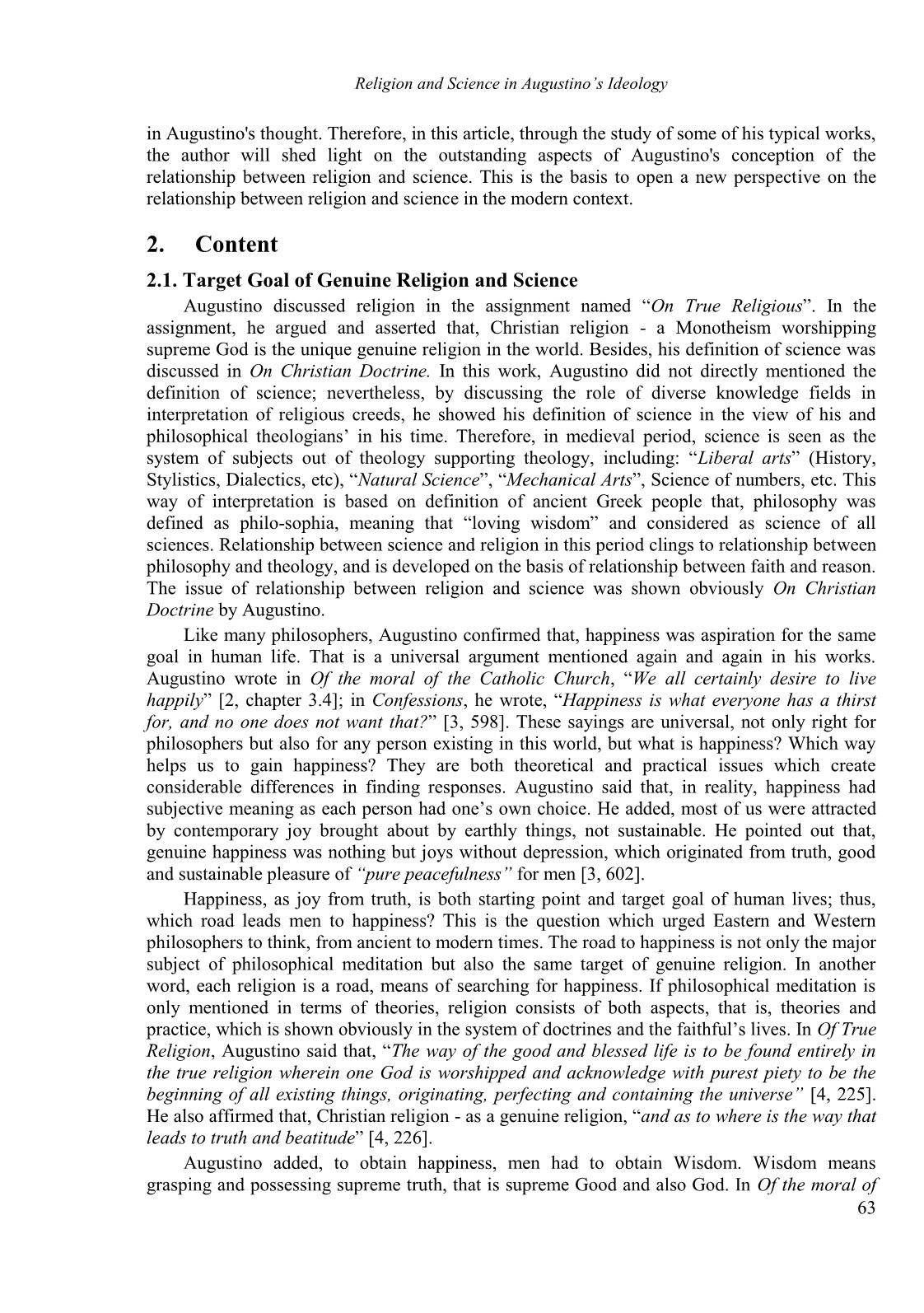
Trang 2
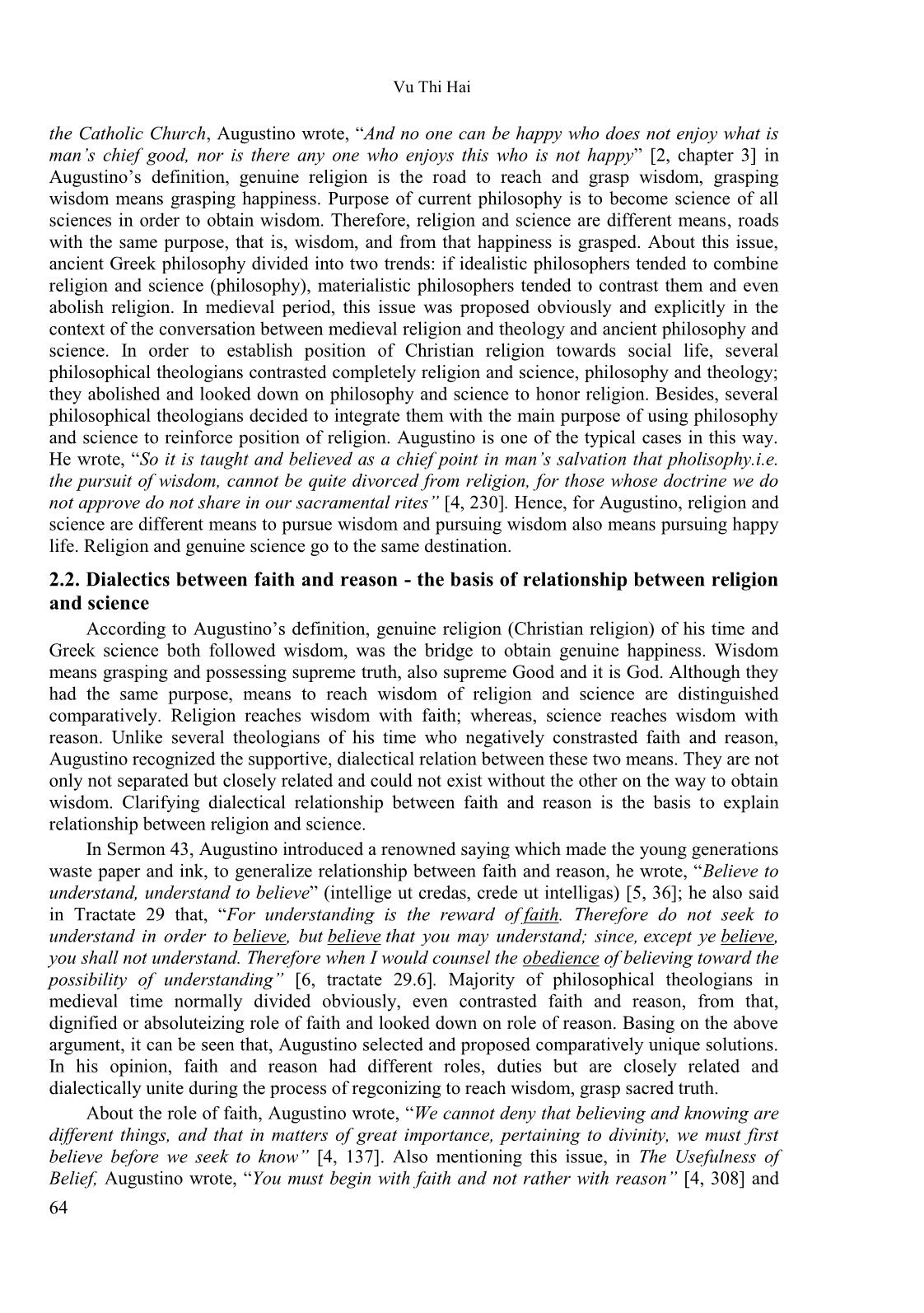
Trang 3
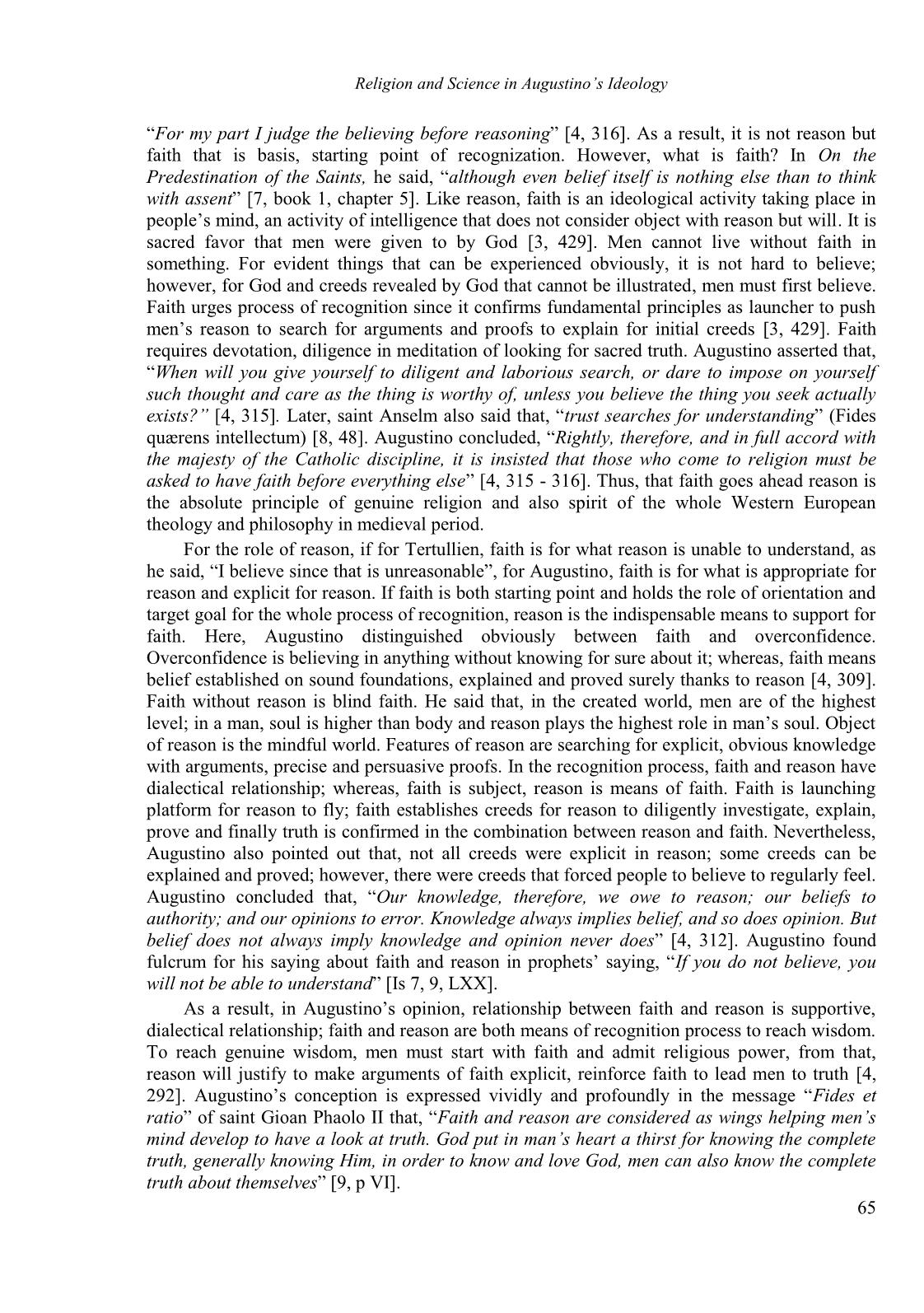
Trang 4
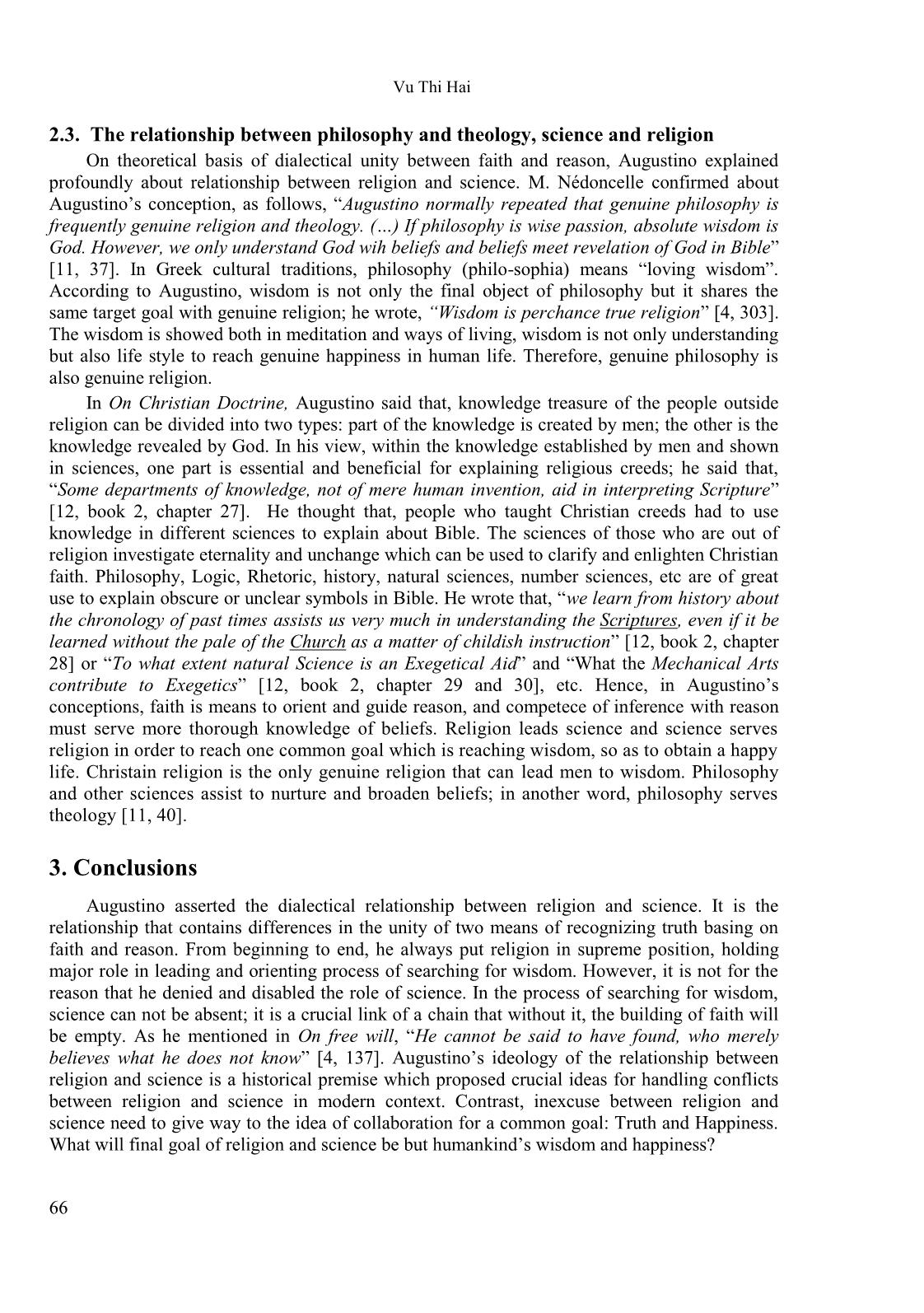
Trang 5
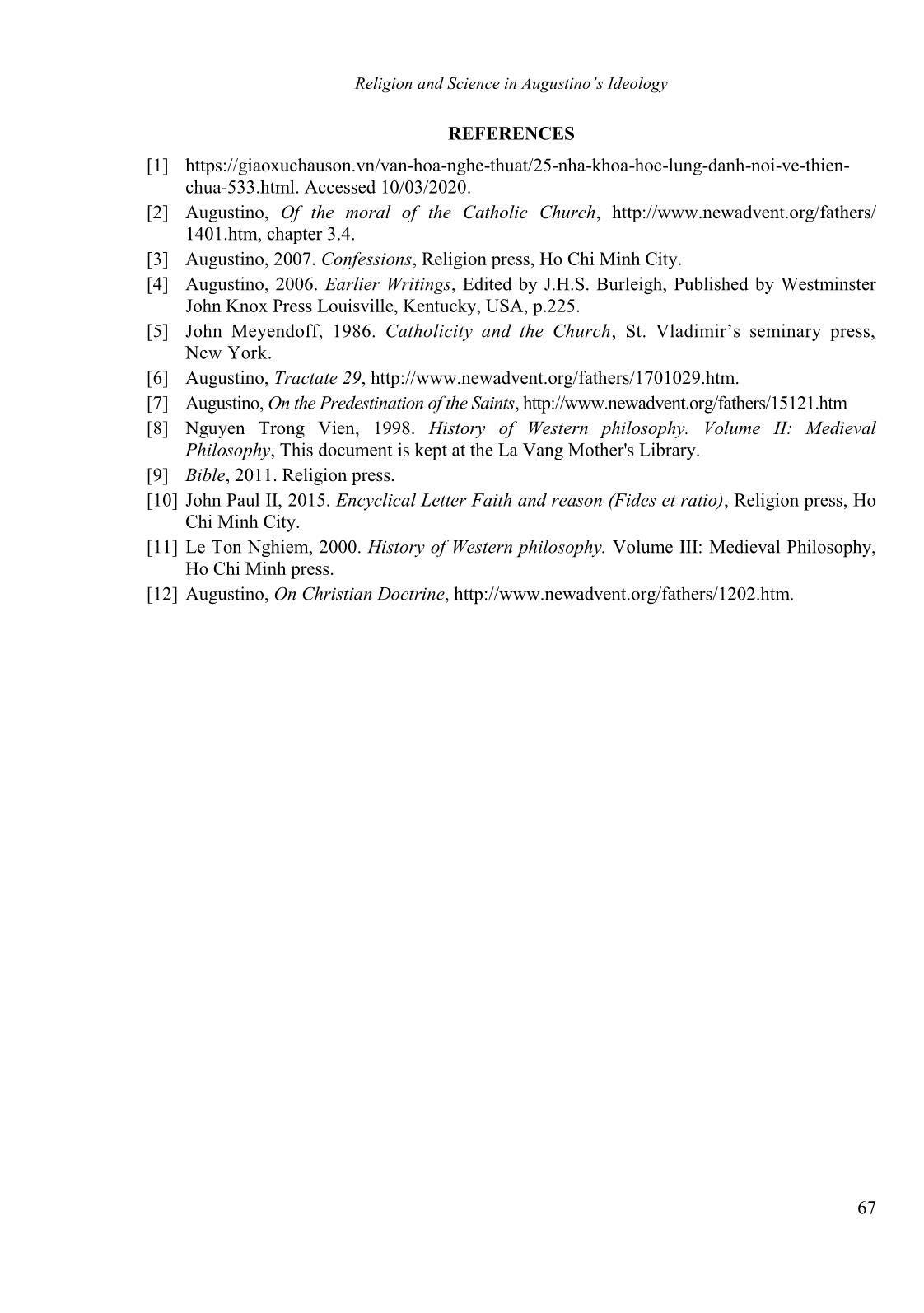
Trang 6
Bạn đang xem tài liệu "Religion and science in Augustino’s ideology", để tải tài liệu gốc về máy hãy click vào nút Download ở trên
Tóm tắt nội dung tài liệu: Religion and science in Augustino’s ideology
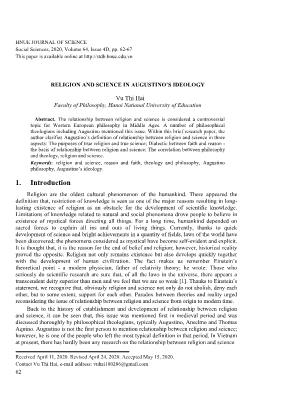
heories, religion consists of both aspects, that is, theories and practice, which is shown obviously in the system of doctrines and the faithful’s lives. In Of True Religion, Augustino said that, “The way of the good and blessed life is to be found entirely in the true religion wherein one God is worshipped and acknowledge with purest piety to be the beginning of all existing things, originating, perfecting and containing the universe” [4, 225]. He also affirmed that, Christian religion - as a genuine religion, “and as to where is the way that leads to truth and beatitude” [4, 226]. Augustino added, to obtain happiness, men had to obtain Wisdom. Wisdom means grasping and possessing supreme truth, that is supreme Good and also God. In Of the moral of Vu Thi Hai 64 the Catholic Church, Augustino wrote, “And no one can be happy who does not enjoy what is man’s chief good, nor is there any one who enjoys this who is not happy” [2, chapter 3] in Augustino’s definition, genuine religion is the road to reach and grasp wisdom, grasping wisdom means grasping happiness. Purpose of current philosophy is to become science of all sciences in order to obtain wisdom. Therefore, religion and science are different means, roads with the same purpose, that is, wisdom, and from that happiness is grasped. About this issue, ancient Greek philosophy divided into two trends: if idealistic philosophers tended to combine religion and science (philosophy), materialistic philosophers tended to contrast them and even abolish religion. In medieval period, this issue was proposed obviously and explicitly in the context of the conversation between medieval religion and theology and ancient philosophy and science. In order to establish position of Christian religion towards social life, several philosophical theologians contrasted completely religion and science, philosophy and theology; they abolished and looked down on philosophy and science to honor religion. Besides, several philosophical theologians decided to integrate them with the main purpose of using philosophy and science to reinforce position of religion. Augustino is one of the typical cases in this way. He wrote, “So it is taught and believed as a chief point in man’s salvation that pholisophy.i.e. the pursuit of wisdom, cannot be quite divorced from religion, for those whose doctrine we do not approve do not share in our sacramental rites” [4, 230]. Hence, for Augustino, religion and science are different means to pursue wisdom and pursuing wisdom also means pursuing happy life. Religion and genuine science go to the same destination. 2.2. Dialectics between faith and reason - the basis of relationship between religion and science According to Augustino’s definition, genuine religion (Christian religion) of his time and Greek science both followed wisdom, was the bridge to obtain genuine happiness. Wisdom means grasping and possessing supreme truth, also supreme Good and it is God. Although they had the same purpose, means to reach wisdom of religion and science are distinguished comparatively. Religion reaches wisdom with faith; whereas, science reaches wisdom with reason. Unlike several theologians of his time who negatively constrasted faith and reason, Augustino recognized the supportive, dialectical relation between these two means. They are not only not separated but closely related and could not exist without the other on the way to obtain wisdom. Clarifying dialectical relationship between faith and reason is the basis to explain relationship between religion and science. In Sermon 43, Augustino introduced a renowned saying which made the young generations waste paper and ink, to generalize relationship between faith and reason, he wrote, “Believe to understand, understand to believe” (intellige ut credas, crede ut intelligas) [5, 36]; he also said in Tractate 29 that, “For understanding is the reward of faith. Therefore do not seek to understand in order to believe, but believe that you may understand; since, except ye believe, you shall not understand. Therefore when I would counsel the obedience of believing toward the possibility of understanding” [6, tractate 29.6]. Majority of philosophical theologians in medieval time normally divided obviously, even contrasted faith and reason, from that, dignified or absoluteizing role of faith and looked down on role of reason. Basing on the above argument, it can be seen that, Augustino selected and proposed comparatively unique solutions. In his opinion, faith and reason had different roles, duties but are closely related and dialectically unite during the process of regconizing to reach wisdom, grasp sacred truth. About the role of faith, Augustino wrote, “We cannot deny that believing and knowing are different things, and that in matters of great importance, pertaining to divinity, we must first believe before we seek to know” [4, 137]. Also mentioning this issue, in The Usefulness of Belief, Augustino wrote, “You must begin with faith and not rather with reason” [4, 308] and Religion and Science in Augustino’s Ideology 65 “For my part I judge the believing before reasoning” [4, 316]. As a result, it is not reason but faith that is basis, starting point of recognization. However, what is faith? In On the Predestination of the Saints, he said, “although even belief itself is nothing else than to think with assent” [7, book 1, chapter 5]. Like reason, faith is an ideological activity taking place in people’s mind, an activity of intelligence that does not consider object with reason but will. It is sacred favor that men were given to by God [3, 429]. Men cannot live without faith in something. For evident things that can be experienced obviously, it is not hard to believe; however, for God and creeds revealed by God that cannot be illustrated, men must first believe. Faith urges process of recognition since it confirms fundamental principles as launcher to push men’s reason to search for arguments and proofs to explain for initial creeds [3, 429]. Faith requires devotation, diligence in meditation of looking for sacred truth. Augustino asserted that, “When will you give yourself to diligent and laborious search, or dare to impose on yourself such thought and care as the thing is worthy of, unless you believe the thing you seek actually exists?” [4, 315]. Later, saint Anselm also said that, “trust searches for understanding” (Fides quærens intellectum) [8, 48]. Augustino concluded, “Rightly, therefore, and in full accord with the majesty of the Catholic discipline, it is insisted that those who come to religion must be asked to have faith before everything else” [4, 315 - 316]. Thus, that faith goes ahead reason is the absolute principle of genuine religion and also spirit of the whole Western European theology and philosophy in medieval period. For the role of reason, if for Tertullien, faith is for what reason is unable to understand, as he said, “I believe since that is unreasonable”, for Augustino, faith is for what is appropriate for reason and explicit for reason. If faith is both starting point and holds the role of orientation and target goal for the whole process of recognition, reason is the indispensable means to support for faith. Here, Augustino distinguished obviously between faith and overconfidence. Overconfidence is believing in anything without knowing for sure about it; whereas, faith means belief established on sound foundations, explained and proved surely thanks to reason [4, 309]. Faith without reason is blind faith. He said that, in the created world, men are of the highest level; in a man, soul is higher than body and reason plays the highest role in man’s soul. Object of reason is the mindful world. Features of reason are searching for explicit, obvious knowledge with arguments, precise and persuasive proofs. In the recognition process, faith and reason have dialectical relationship; whereas, faith is subject, reason is means of faith. Faith is launching platform for reason to fly; faith establishes creeds for reason to diligently investigate, explain, prove and finally truth is confirmed in the combination between reason and faith. Nevertheless, Augustino also pointed out that, not all creeds were explicit in reason; some creeds can be explained and proved; however, there were creeds that forced people to believe to regularly feel. Augustino concluded that, “Our knowledge, therefore, we owe to reason; our beliefs to authority; and our opinions to error. Knowledge always implies belief, and so does opinion. But belief does not always imply knowledge and opinion never does” [4, 312]. Augustino found fulcrum for his saying about faith and reason in prophets’ saying, “If you do not believe, you will not be able to understand” [Is 7, 9, LXX]. As a result, in Augustino’s opinion, relationship between faith and reason is supportive, dialectical relationship; faith and reason are both means of recognition process to reach wisdom. To reach genuine wisdom, men must start with faith and admit religious power, from that, reason will justify to make arguments of faith explicit, reinforce faith to lead men to truth [4, 292]. Augustino’s conception is expressed vividly and profoundly in the message “Fides et ratio” of saint Gioan Phaolo II that, “Faith and reason are considered as wings helping men’s mind develop to have a look at truth. God put in man’s heart a thirst for knowing the complete truth, generally knowing Him, in order to know and love God, men can also know the complete truth about themselves” [9, p VI]. Vu Thi Hai 66 2.3. The relationship between philosophy and theology, science and religion On theoretical basis of dialectical unity between faith and reason, Augustino explained profoundly about relationship between religion and science. M. Nédoncelle confirmed about Augustino’s conception, as follows, “Augustino normally repeated that genuine philosophy is frequently genuine religion and theology. () If philosophy is wise passion, absolute wisdom is God. However, we only understand God wih beliefs and beliefs meet revelation of God in Bible” [11, 37]. In Greek cultural traditions, philosophy (philo-sophia) means “loving wisdom”. According to Augustino, wisdom is not only the final object of philosophy but it shares the same target goal with genuine religion; he wrote, “Wisdom is perchance true religion” [4, 303]. The wisdom is showed both in meditation and ways of living, wisdom is not only understanding but also life style to reach genuine happiness in human life. Therefore, genuine philosophy is also genuine religion. In On Christian Doctrine, Augustino said that, knowledge treasure of the people outside religion can be divided into two types: part of the knowledge is created by men; the other is the knowledge revealed by God. In his view, within the knowledge established by men and shown in sciences, one part is essential and beneficial for explaining religious creeds; he said that, “Some departments of knowledge, not of mere human invention, aid in interpreting Scripture” [12, book 2, chapter 27]. He thought that, people who taught Christian creeds had to use knowledge in different sciences to explain about Bible. The sciences of those who are out of religion investigate eternality and unchange which can be used to clarify and enlighten Christian faith. Philosophy, Logic, Rhetoric, history, natural sciences, number sciences, etc are of great use to explain obscure or unclear symbols in Bible. He wrote that, “we learn from history about the chronology of past times assists us very much in understanding the Scriptures, even if it be learned without the pale of the Church as a matter of childish instruction” [12, book 2, chapter 28] or “To what extent natural Science is an Exegetical Aid” and “What the Mechanical Arts contribute to Exegetics” [12, book 2, chapter 29 and 30], etc. Hence, in Augustino’s conceptions, faith is means to orient and guide reason, and competece of inference with reason must serve more thorough knowledge of beliefs. Religion leads science and science serves religion in order to reach one common goal which is reaching wisdom, so as to obtain a happy life. Christain religion is the only genuine religion that can lead men to wisdom. Philosophy and other sciences assist to nurture and broaden beliefs; in another word, philosophy serves theology [11, 40]. 3. Conclusions Augustino asserted the dialectical relationship between religion and science. It is the relationship that contains differences in the unity of two means of recognizing truth basing on faith and reason. From beginning to end, he always put religion in supreme position, holding major role in leading and orienting process of searching for wisdom. However, it is not for the reason that he denied and disabled the role of science. In the process of searching for wisdom, science can not be absent; it is a crucial link of a chain that without it, the building of faith will be empty. As he mentioned in On free will, “He cannot be said to have found, who merely believes what he does not know” [4, 137]. Augustino’s ideology of the relationship between religion and science is a historical premise which proposed crucial ideas for handling conflicts between religion and science in modern context. Contrast, inexcuse between religion and science need to give way to the idea of collaboration for a common goal: Truth and Happiness. What will final goal of religion and science be but humankind’s wisdom and happiness? Religion and Science in Augustino’s Ideology 67 REFERENCES [1] https://giaoxuchauson.vn/van-hoa-nghe-thuat/25-nha-khoa-hoc-lung-danh-noi-ve-thien- chua-533.html. Accessed 10/03/2020. [2] Augustino, Of the moral of the Catholic Church, 1401.htm, chapter 3.4. [3] Augustino, 2007. Confessions, Religion press, Ho Chi Minh City. [4] Augustino, 2006. Earlier Writings, Edited by J.H.S. Burleigh, Published by Westminster John Knox Press Louisville, Kentucky, USA, p.225. [5] John Meyendoff, 1986. Catholicity and the Church, St. Vladimir’s seminary press, New York. [6] Augustino, Tractate 29, [7] Augustino, On the Predestination of the Saints, [8] Nguyen Trong Vien, 1998. History of Western philosophy. Volume II: Medieval Philosophy, This document is kept at the La Vang Mother's Library. [9] Bible, 2011. Religion press. [10] John Paul II, 2015. Encyclical Letter Faith and reason (Fides et ratio), Religion press, Ho Chi Minh City. [11] Le Ton Nghiem, 2000. History of Western philosophy. Volume III: Medieval Philosophy, Ho Chi Minh press. [12] Augustino, On Christian Doctrine,
File đính kèm:
 religion_and_science_in_augustinos_ideology.pdf
religion_and_science_in_augustinos_ideology.pdf

